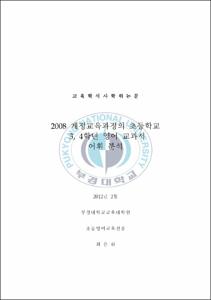2008 개정교육과정의 초등학교 3, 4학년 영어 교과서 어휘 분석
- Alternative Title
- An Analysis of the Vocabulary in Elementary 3rd & 4th graders English Textbooks under the 2008 Revised National Curriculum
- Abstract
- The purpose of this study is to analyze elementary school English textbooks for grades 3 and 4, which are being used under Educational Curriculum revised in 2008 to determine whether they provided vocabulary in an appropriate and sequential way. It is especially meant to make a comparative analysis, in terms of following.: ⅰ) the rate of complying with the recommended vocabulary lists; ⅱ) number of vocabularies for each lesson of the selected 3 English textbooks; ⅲ) frequency and distribution of vocabulary, and interval of repeating the same vocabulary in different lessons of the three textbooks.
The findings of this study are as follows: First, the mean rate of complying with the new basic vocabulary lists recommended by the Ministry of Education stood at 97.9% in the third grade, and 91.3% in the forth grade, which indicated that the textbooks properly conform to that ministry's recommendation. Second, the distribution of new words per lesson of textbook A was comparatively more regular than textbooks B, C. Third, in terms of the frequency of words in the three textbooks, words appearing more than six times accounted for 86.3% in the 3rd grade, 70.2% in the 4th grade, and 50.6% in the 3rd grade new words that appear in 4th grade textbooks. For successful vocabulary acquisition, low-frequency words should be avoided and high-frequency ones should be covered, instead. Fourth, distribution rated of words over 4 in the three textbooks, accounted for 26.8% in the 3rd grade, 10.2% in the 4th grade, and 33.6% in the 3rd grade new words that appear in 4th grade textbooks. Learners will have difficulties acquiring them as they are offered. To accelerate their vocabulary building, every word should be presented four times or more. Lastly, the interval of repetition for each word below 5 in the three textbooks, accounted for 45.4% in the 3rd grade, 33.4% in the 4th grade, and 36.3% in the 3rd grade new words that appear in 4th grade textbooks. They should be arranged in a manner to ensure efficient repetitive learning.
- Issued Date
- 2012
- Awarded Date
- 2012. 2
- Type
- Dissertation
- Keyword
- 초등 영어 교과서 어휘
- Publisher
- 부경대학교 교육대학원
- Alternative Author(s)
- EunHA Choi
- Affiliation
- 부경대학교
- Department
- 교육대학원 초등영어교육전공
- Advisor
- 김은일
- Table Of Contents
- Ⅰ. 서론 1
1.1. 연구의 필요성 및 목적 1
1.2. 연구 문제 2
1.3. 연구의 제한점 3
Ⅱ. 이론적 배경 4
2.1. 어휘와 어휘력의 개념 4
2.2. 내용어와 기능어 5
2.3. 어휘의 학습량 6
2.4. 어휘 선정의 필요성 8
2.5. 어휘 선정의 기준 9
Ⅲ. 연구 방법 13
3.1. 연구대상 13
3.2. 연구절차 14
3.3. 연구 분석 기준 14
Ⅳ. 자료 분석 결과 17
4.1. 기본어휘 반영률 17
4.2. 단원별 신어휘 수량 분석 19
4.3. 어휘의 빈도 22
4.4. 어휘의 분포 30
4.5. 어휘의 반복 간격 37
Ⅴ. 결론 42
참고문헌 46
부록 50
- Degree
- Master
- Files in This Item:
-
-
Download
 2008 개정교육과정의 초등학교 3, 4학년 영어 교과서 어휘 분석.pdf
기타 데이터 / 742.35 kB / Adobe PDF
2008 개정교육과정의 초등학교 3, 4학년 영어 교과서 어휘 분석.pdf
기타 데이터 / 742.35 kB / Adobe PDF
-
Items in Repository are protected by copyright, with all rights reserved, unless otherwise indicated.